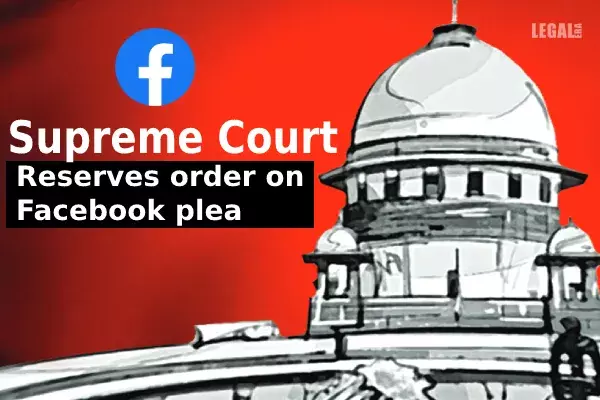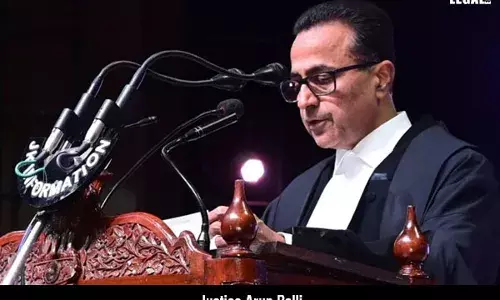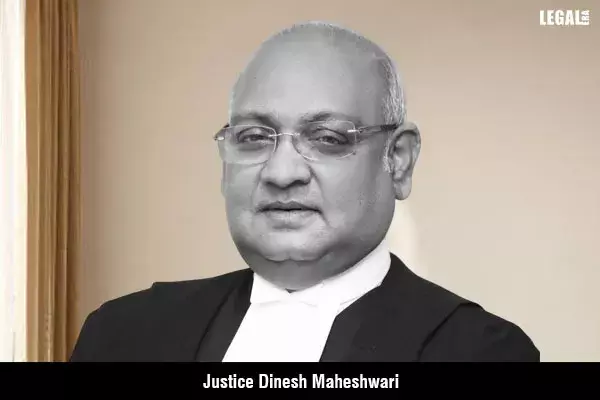Supreme Court reserves order on Facebook plea
Facebook seeks Court's nod to duck the Delhi assembly summons to appear before its panel probing February 2020 communal;

Supreme Court reserves order on Facebook plea Facebook seeks Court's nod to duck the Delhi assembly summons to appear before its panel probing February 2020 communal riots in the city The Supreme Court has reserved its order on social media platform Facebook's plea seeking quashing of the summons issued by the Delhi legislative assembly. A panel of the Delhi assembly on peace and harmony...
Supreme Court reserves order on Facebook plea
Facebook seeks Court's nod to duck the Delhi assembly summons to appear before its panel probing February 2020 communal riots in the city
The Supreme Court has reserved its order on social media platform Facebook's plea seeking quashing of the summons issued by the Delhi legislative assembly.
A panel of the Delhi assembly on peace and harmony is currently looking into complaints on the role or complicity of Facebook officials in the communal riots that rocked the Indian capital in February last year.
Facebook on 24 February 2021 took a stand before the Supreme Court that while it is agreeable and complying with all Indian laws but it cannot be compelled to subject itself to the jurisdiction of Parliament and state assemblies as it has a right to maintain silence.
Senior Advocate Harish Salve represented Facebook in the Apex Court bench of Justices Sanjay Kishan Kaul, Dinesh Maheshwari and Hrishikesh Roy. Salve told the Court that the company and its representatives cannot be forced to appear before the legislative panel to give an opinion, and the summons of the Delhi assembly committee reeks of constitutional arrogance.
Salve justified the company's stand to silence and its policy of pick and choose in matters of appearing before panels of the legislative bodies in India. Asked by the bench about why it was hesitant to comply with summons of the Delhi assembly panel when its representative had previously appeared before Parliament's standing committee on information technology, Salve submitted that it was for the company to decide whether to appear before any committee and termed appearing before the parliamentary committed as a voluntary act.
"I went there for commercial compulsion. It is my choice where to appear. But I cannot be compelled. I have the right not to participate. It is my constitutional right to speech and silence," Salve submitted to the Court.
Salve informed the Court that the company did not wish to be a party to political feud over the riots since its role was limited to providing a platform for debate without participating in it. "There is divide on what happened and who is responsible for Delhi violence. What is going on is a political battle and I do not want to be part of it," Salve said.
The Apex Court bench, however, did not appear impressed with Facebook's stand and observed that Facebook could not run away from the responsibility on what is happening on its platform. "You provide a platform where debate takes place. Can you then say that my hands are off? It is something which is troubling my mind," Justice Kaul said.
Solicitor General Tushar Mehta strongly challenged Facebook's stand and told the bench that Facebook cannot take a stand that it could not subject itself to the jurisdiction of Parliament. He said the company had to appear even before competent jurisdiction of an assembly.
The Solicitor General, however, termed the Delhi assembly's summons to Facebook as wrong clarifying that the law and order in Delhi comes within the Centre's jurisdiction.
Earlier, Delhi Assembly had told the bench that being an elected representative, it was its duty to examine measures to prevent online mass hate and consequent violence in its geographical area and the company cannot make the excuse that peace and harmony comes within the Centre's list of public order.
Delhi assembly enjoys limited powers compared to other state assemblies. Delhi being a Union Territory and the national capital, law and order, as well as land, are included in the central list which has always been a bone of contention between the centre and the state government.





